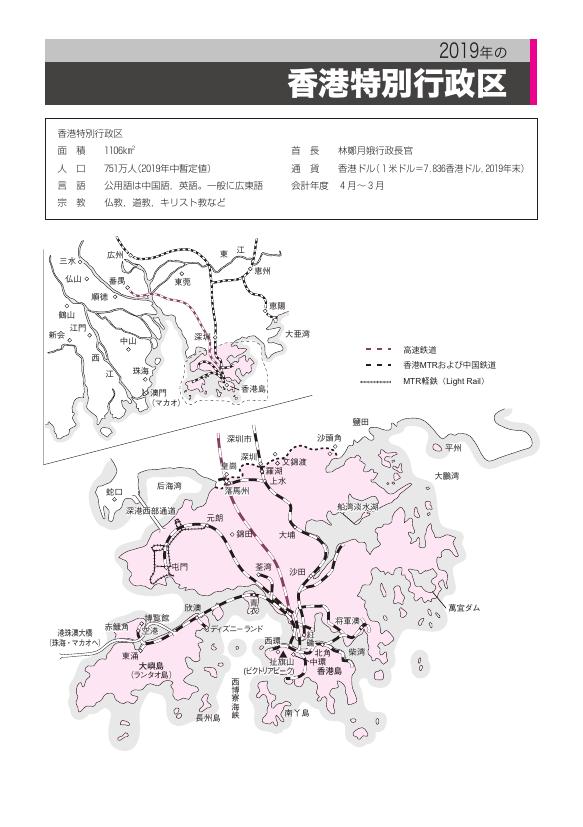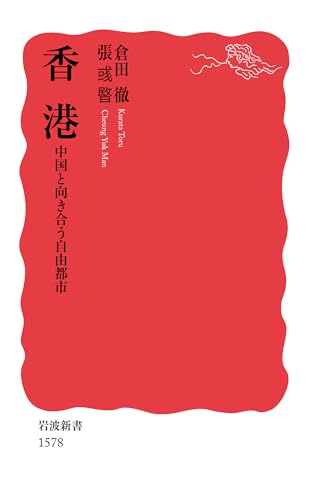13 0 0 0 OA インタビューで知る研究最前線
- 著者
- 倉田 徹 澤田 ゆかり 長峯 ゆりか
- 出版者
- 独立行政法人 日本貿易振興機構アジア経済研究所
- 雑誌
- アジア経済 (ISSN:00022942)
- 巻号頁・発行日
- vol.61, no.2, pp.36-58, 2020-06-15 (Released:2020-07-01)
- 参考文献数
- 4
12 0 0 0 OA 雨傘運動とその後の香港政治―一党支配と分裂する多元的市民社会
- 著者
- 倉田 徹
- 出版者
- 一般財団法人 アジア政経学会
- 雑誌
- アジア研究 (ISSN:00449237)
- 巻号頁・発行日
- vol.63, no.1, pp.68-84, 2017-01-31 (Released:2017-03-24)
- 参考文献数
- 12
The 2014 Umbrella Movement in Hong Kong succeeded in mobilizing large number of people by demanding democracy which meets “international standards” and by deteriorating “Hong Kong–China conflict”. However, there is a difference of nature between “international standards” and “Hong Kong–China conflict”. The former represents elitist value and the supporters of the international standards prefer liberal and peaceful activities, while the latter is an issue particular to Hong Kong, and people demanding to solve the issue tends to criticize those westernized elites who are apart from the Hong Kong society. They are Hong Kong nationalists and they accept violent resistance to a certain extent. During the prolonged Umbrella Movement, nationalists criticized liberal leaders of the movement and the dispute split the movement. After the movement, Liberal members formed “Self-determination groups” who insists that Hong Kong people should determine their own political future through referendum. And nationalists formed “Localist groups” who see Hong Kong people as a nation and expel mainlanders. Although there exists conflict between the Self-determination groups and the Localist groups, both of them rely on political freedom which enables political activities on the street and rule of law which protects the rights of opposition. Although both political freedom and rule of law in Hong Kong are now under threat to a certain extent, internet freedom and judicial independence is guaranteed so far. When the government tries to infringe on it, both Self-determination groups and Localist groups resist strongly. And both groups are in opposition to the Chinese central government. Both “democratic self-determination” which liberals demands and “self-determination of nations” which localists demands are not acceptable for the central government. Central government tries to isolate “a very few” pro-independence groups by co-opting democrats and moderate localists. But if the central government take action to expel radicals, they would make an enemy of liberals at the same time. In the Legislative Council election on 4th Sep. 2016, 6 members of the new political groups (3 candidates from “Self-determination groups” and 3 candidates from “Localist groups”) were successfully elected. Legco may experience a huge change by accepting new members of new generations. But before the election, the Government rejected some candidates whom the Government saw as pro-independent and some newly elected Legco members were disqualified by not swearing allegiance to the PRC. They brought some actions against the Government and the new political groups which arose from street politics are to continue its fight against the Government both in the parliament and court.
4 0 0 0 OA 返還後20年の香港政治 : 中国と香港の巨大な変化
- 著者
- 倉田 徹 クラタ トオル Toru Kurata
- 雑誌
- 立教法学
- 巻号頁・発行日
- vol.98, pp.301-281, 2018-03-25
3 0 0 0 OA 2017年の香港特別行政区 返還20周年,新長官の就任と新たな政治課題
- 著者
- 倉田 徹
- 出版者
- 独立行政法人 日本貿易振興機構アジア経済研究所
- 雑誌
- アジア動向年報 (ISSN:09151109)
- 巻号頁・発行日
- vol.2018, pp.155-174, 2018 (Released:2019-03-27)
2 0 0 0 OA 中国政治・社会の変容に対する香港の役割の研究
本研究では、「一国二制度」方式で統治されている香港が、中国の政治・社会の変容に対してどのような影響を与えているかを分析した。当初、香港のキリスト教団体を中心に、中国大陸および香港での調査を行い、香港の市民社会が中国の変容に対して果たしている役割について、具体的な事例研究を行うことができた。研究期間中の2014年には、中国政府が提案した民主化案に反対する学生・市民によって、香港で「雨傘運動」と呼ばれる大規模民主化運動が発生し、この運動をめぐる政治動向の分析に焦点を当て、関係者へのインタビューなどを行った。研究成果はすでに書籍や論文の形式で多数発表されている。
1 0 0 0 OA 2019年の香港特別行政区 大規模デモと政治危機の発生
- 著者
- 倉田 徹(くらた とおる)
- 出版者
- 独立行政法人 日本貿易振興機構アジア経済研究所
- 雑誌
- アジア動向年報 (ISSN:09151109)
- 巻号頁・発行日
- vol.2020, pp.131-150, 2020 (Released:2020-12-17)
1 0 0 0 OA 腹腔鏡補助下肝切除術後早期に癌性リンパ管症を発症した混合型肝癌の1例
- 著者
- 倉田 徹 中沼 伸一 林 泰寛 田島 秀浩 高村 博之 太田 哲生
- 出版者
- 日本臨床外科学会
- 雑誌
- 日本臨床外科学会雑誌 (ISSN:13452843)
- 巻号頁・発行日
- vol.75, no.10, pp.2839-2843, 2014 (Released:2015-04-30)
- 参考文献数
- 21
症例は82歳,女性.非アルコール性脂肪肝炎,糖尿病の加療中に肝S4/8,径5cmの肝腫瘤を指摘された.術前検査ではリンパ節,遠隔転移を認めず,腹腔鏡下に胆嚢摘出術,肝右葉授動の後,小開腹下にS4+前腹側区域の肝切除術を行った.病理結果は中~低分化型肝細胞癌成分と低分化型胆管癌成分が混在する混合型肝癌であり,切除断端は陰性であった.術後第26病日に呼吸苦が出現し,低酸素血症と両肺野の広範なスリガラス陰影の出現を認めた.急性呼吸性窮迫症候群と判断し集学的治療を開始したが,42日後死亡した.死後の肺生検にて胆管癌に類似した腺管構造を有する腫瘍細胞の増殖と繊維化を認め,癌性リンパ管症と診断した.術後早期に癌性リンパ管症を発症した原因として,悪性度の高い胆管癌成分を有していたことに加え高齢や肝切離面積が比較的広範囲となり手術侵襲が増大したことにより腫瘍の形成・転移能が促進された可能性も推測された.
1 0 0 0 OA 香港立法会議員選挙 : 「中国式化」で市民社会は制圧されるか
- 著者
- 倉田 徹 クラタ トオル Toru Kurata
- 雑誌
- 立教法学
- 巻号頁・発行日
- vol.106, pp.82-107, 2022-03-31
1 0 0 0 OA 2018年の香港特別行政区 独立派への強硬路線の継続と米中貿易戦争の影
- 著者
- 倉田 徹
- 出版者
- 独立行政法人 日本貿易振興機構アジア経済研究所
- 雑誌
- アジア動向年報 (ISSN:09151109)
- 巻号頁・発行日
- vol.2019, pp.151-170, 2019 (Released:2019-10-24)
1 0 0 0 OA 「一国二制度」下の中国―香港関係
- 著者
- 倉田 徹
- 出版者
- 一般財団法人 アジア政経学会
- 雑誌
- アジア研究 (ISSN:00449237)
- 巻号頁・発行日
- vol.49, no.4, pp.26-43, 2003 (Released:2014-09-15)
1 0 0 0 雨傘運動とその後の香港政治―一党支配と分裂する多元的市民社会
- 著者
- 倉田 徹
- 出版者
- 一般財団法人 アジア政経学会
- 雑誌
- アジア研究 (ISSN:00449237)
- 巻号頁・発行日
- vol.63, no.1, pp.68-84, 2017
<p>The 2014 Umbrella Movement in Hong Kong succeeded in mobilizing large number of people by demanding democracy which meets "international standards" and by deteriorating "Hong Kong–China conflict". </p><p>However, there is a difference of nature between "international standards" and "Hong Kong–China conflict". The former represents elitist value and the supporters of the international standards prefer liberal and peaceful activities, while the latter is an issue particular to Hong Kong, and people demanding to solve the issue tends to criticize those westernized elites who are apart from the Hong Kong society. They are Hong Kong nationalists and they accept violent resistance to a certain extent. During the prolonged Umbrella Movement, nationalists criticized liberal leaders of the movement and the dispute split the movement. </p><p>After the movement, Liberal members formed "Self-determination groups" who insists that Hong Kong people should determine their own political future through referendum. And nationalists formed "Localist groups" who see Hong Kong people as a nation and expel mainlanders. </p><p>Although there exists conflict between the Self-determination groups and the Localist groups, both of them rely on political freedom which enables political activities on the street and rule of law which protects the rights of opposition. Although both political freedom and rule of law in Hong Kong are now under threat to a certain extent, internet freedom and judicial independence is guaranteed so far. When the government tries to infringe on it, both Self-determination groups and Localist groups resist strongly. </p><p>And both groups are in opposition to the Chinese central government. Both "democratic self-determination" which liberals demands and "self-determination of nations" which localists demands are not acceptable for the central government. Central government tries to isolate "a very few" pro-independence groups by co-opting democrats and moderate localists. But if the central government take action to expel radicals, they would make an enemy of liberals at the same time. </p><p>In the Legislative Council election on 4th Sep. 2016, 6 members of the new political groups (3 candidates from "Self-determination groups" and 3 candidates from "Localist groups") were successfully elected. Legco may experience a huge change by accepting new members of new generations. But before the election, the Government rejected some candidates whom the Government saw as pro-independent and some newly elected Legco members were disqualified by not swearing allegiance to the PRC. They brought some actions against the Government and the new political groups which arose from street politics are to continue its fight against the Government both in the parliament and court. </p>
1 0 0 0 香港 : 中国と向き合う自由都市
1 0 0 0 OA 東アジア文化の構築
- 著者
- 倉田 徹
- 出版者
- Center of Excellence-Contemporary Asian Studies
- 巻号頁・発行日
- pp.1-14, 2006
Copyright (c) Center of Excellence-Contemporary Asian Studies




